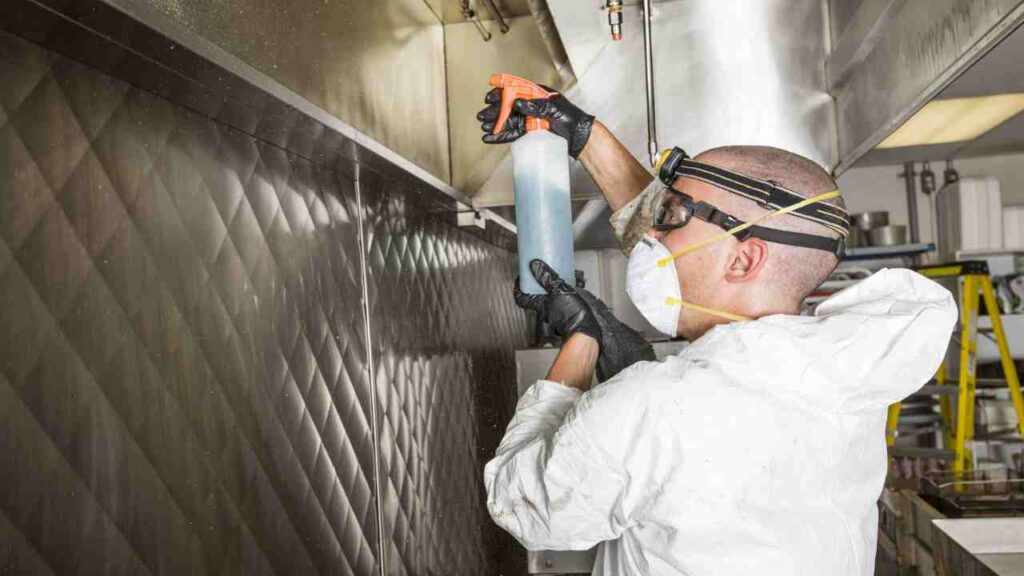Tips to Avoid Health Risks from Dirty Kitchen Exhaust

Ontario-wide Kitchen Exhaust and Hood Cleaning – Best prices and service guaranteed.
Having a clean and well-maintained kitchen is essential for the health and safety of your household. One often overlooked aspect of kitchen cleanliness is the exhaust system. A dirty kitchen exhaust can pose serious health risks if not properly maintained. In this article, we will explore the importance of a clean kitchen exhaust and provide valuable tips to avoid health risks associated with a dirty exhaust.
The Importance of a Clean Kitchen Exhaust
A kitchen exhaust system plays a crucial role in maintaining indoor air quality by removing smoke, grease, odors, and other airborne contaminants generated during cooking. However, over time, the exhaust system can accumulate grease, dirt, and other debris, leading to a range of health risks. Here are some reasons why a clean kitchen exhaust is important:
- Prevents Fire Hazards: Grease buildup in the exhaust system can become highly flammable and increase the risk of a kitchen fire. According to the National Fire Protection Association, cooking equipment was involved in almost half of all reported home fires between 2014 and 2018.
- Reduces Airborne Contaminants: A dirty kitchen exhaust can release harmful pollutants into the air, such as carbon monoxide, nitrogen dioxide, and volatile organic compounds (VOCs). Prolonged exposure to these pollutants can lead to respiratory problems, allergies, and other health issues.
- Improves Indoor Air Quality: A clean kitchen exhaust helps maintain a healthy indoor environment by removing cooking odors, smoke, and excess moisture. This is particularly important for individuals with respiratory conditions, such as asthma or allergies.
Tips to Keep Your Kitchen Exhaust Clean
Now that we understand the importance of a clean kitchen exhaust, let’s explore some practical tips to help you maintain a healthy and safe kitchen environment:
1. Regular Cleaning
Regular cleaning is the key to preventing grease buildup in your kitchen exhaust system. Here are some cleaning tips:
- Remove and clean the exhaust fan blades and housing at least once every three months.
- Wipe down the exhaust hood and surrounding areas with a degreaser to remove grease and grime.
- Use a vacuum cleaner with a brush attachment to clean the exhaust ducts and vents.
- Consider hiring a professional cleaning service for a thorough and deep cleaning of your kitchen exhaust system at least once a year.
-
Ontario-wide Kitchen Exhaust and Hood Cleaning – Best prices and service guaranteed.
2. Install and Maintain Grease Filters
Grease filters are an essential component of a kitchen exhaust system. They capture grease particles and prevent them from entering the ductwork. Here’s how you can effectively use and maintain grease filters:
- Install high-quality grease filters that are compatible with your exhaust system.
- Clean or replace the grease filters regularly, depending on the manufacturer’s instructions.
- Soak the filters in warm water and a degreasing solution to remove stubborn grease buildup.
- Ensure the filters are completely dry before reinstalling them to prevent mold growth.
3. Monitor and Clean Exhaust Ducts
The exhaust ducts are responsible for carrying the contaminated air out of your kitchen. It’s important to monitor and clean them regularly to prevent blockages and maintain optimal airflow. Here’s what you can do:
- Inspect the exhaust ducts for any signs of blockages, such as excessive grease buildup or debris.
- Use a flashlight to check for light leaks, which indicate gaps or holes in the ductwork that need to be sealed.
- Clean the ducts using a specialized brush or hire a professional duct cleaning service to ensure thorough cleaning.
-
Ontario-wide Kitchen Exhaust and Hood Cleaning – Best prices and service guaranteed.
4. Educate and Train Kitchen Staff
If you run a commercial kitchen, it’s crucial to educate and train your kitchen staff on the importance of maintaining a clean kitchen exhaust system. Here’s how you can promote good practices:
- Provide training on proper cleaning techniques and schedules for the exhaust system.
- Emphasize the importance of regular maintenance and the potential health risks associated with a dirty exhaust.
- Encourage staff to report any issues or concerns regarding the kitchen exhaust system promptly.
- Implement a system for regular inspections to ensure compliance with cleaning protocols.
Ontario-wide Kitchen Exhaust and Hood Cleaning – Best prices and service guaranteed.
A clean kitchen exhaust is essential for maintaining a healthy and safe kitchen environment. By following the tips mentioned in this article, you can reduce the risk of fire hazards, improve indoor air quality, and protect the health of your household. Regular cleaning, proper maintenance of grease filters and exhaust ducts, and educating kitchen staff are all crucial steps in avoiding health risks associated with a dirty kitchen exhaust. Remember, a clean kitchen exhaust is not just about aesthetics; it’s about safeguarding the well-being of your loved ones.
Learn more about “How to clean kitchen exhaust safely” right here.
Frequently asked questions about Tips to Avoid Health Risks from Dirty Kitchen Exhaust.

How Often Should I Clean My Kitchen Exhaust to Avoid Health Risks? 🗓️
Hey there, clean-freaks and kitchen kings and queens! 🌟 One of the most common questions we get is about the frequency of cleaning your kitchen exhaust. The short answer? It depends on how much you cook. But here’s the breakdown to keep you on the safe side:
Home Kitchens: If you cook often, a good rule of thumb is to clean the grease filters at least once a month. The internal ducts can go a bit longer—every 3 to 6 months is usually okay. 🏡
Commercial Kitchens: For the pros out there, the exhaust system should be professionally cleaned at least every 3 months. Some busy establishments even require monthly cleanings. 🍳
By sticking to this schedule, you can avoid the buildup of grease and grime, which can lead to health problems like respiratory issues and allergies. Not to mention, you’re minimizing the fire risks, too. So, set a reminder, and make it a ritual! 📅
What Type of Cleaning Solutions Are Safe and Effective? 🧴
Howdy, cleaner-uppers! 🤠 When it comes to cleaning solutions, you want something that’s not only effective but also safe for you and anyone else who frequents the kitchen.
Natural Cleaners: Vinegar and baking soda are great natural alternatives that are also effective grease-busters. 🍃
Industrial Cleaners: If you’re going the industrial route, make sure to choose a cleaner that’s eco-friendly and non-toxic. Always read the labels and safety guidelines! 🏭
Ventilation: Regardless of what type of cleaner you’re using, ensure that the area is well-ventilated. You don’t want to be inhaling fumes while you’re trying to create a cleaner, healthier environment. 🌬️
Choosing the right cleaner is crucial in making your exhaust system not just clean, but safe as well. 👍
Can Dirty Kitchen Exhaust Affect Food Quality? 🍲
Hello, foodies and chefs! 👩🍳👨🍳 Yes, a dirty kitchen exhaust can absolutely affect food quality, and here’s why:
Odor Transfer: Leftover grease and grime can cause unpleasant odors, which could potentially transfer to your freshly cooked meals. 🤢
Smoke and Fumes: A dirty exhaust system won’t ventilate properly. This means that smoke and fumes linger, affecting both the taste and safety of your food. 🔥
Air Quality: Poor ventilation can lead to a buildup of harmful particles in the air, which could, over time, settle on your food. 😷
Cleaning your exhaust system is not just a matter of safety; it’s also about preserving the purity and deliciousness of your food. 🍔
How Does a Dirty Exhaust System Contribute to Pest Infestations? 🐜
Hey critter haters, listen up! 🙅♀️🙅♂️ A dirty kitchen exhaust is like an open invitation to pests. The accumulation of grease and grime creates a perfect breeding ground for cockroaches, rats, and even some smaller pests like fruit flies. 🐭🦟
Eliminate the Source: By regularly cleaning your exhaust system, you’re essentially cutting off their food supply and making your kitchen less attractive to these unwanted guests. 👋
Seal Potential Entry Points: While you’re cleaning, check for any gaps or holes in the ducts that can serve as entry points for pests and seal them up. 🚫
By keeping your kitchen exhaust clean, you’re not just improving human health but also reducing the risk of pest-related diseases. 🛡️
What Are the Respiratory Risks of a Dirty Kitchen Exhaust? 😷
Hello, breathers and non-breathers alike! (Just kidding, we’re all breathers here!) 🌬️ A dirty exhaust system can pose several respiratory risks.
Allergens: Grease and grime can often trap allergens, which can aggravate conditions like asthma or allergies. 🤧
Airborne Contaminants: A poorly maintained exhaust system won’t properly filter the air, leaving airborne particles to circulate around the kitchen. 🌫️
Mold: Yes, mold can accumulate in dirty, damp places, and your exhaust system is no exception. Inhaling mold spores can lead to a host of respiratory issues. 🤒
To breathe easier (literally), keep that exhaust system spick and span! Your lungs will thank you. 🌈
Remember folks, a clean kitchen exhaust system isn’t just about cleanliness; it’s an investment in your health and well-being. So grab those cleaning supplies and get to work, safely and wisely! 🌟
- hood cleaning
- kitchen exhaust cleaning
- restaurant hood cleaning
- Tips to Avoid Health Risks from Dirty Kitchen Exhaust







